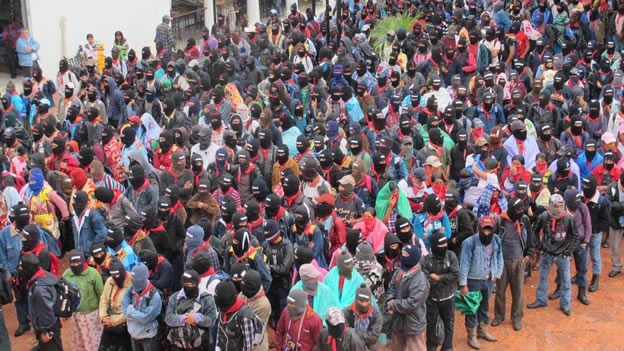Translated from Portuguese by Tamara van der Putten.
“Abajo y a la izquierda está el corazón” — “the heart lies below and to the left”. This sentence by Subcomandante Marcos of the Zapatista Army of National Liberation (EZLN) in Mexico was used in an opening speech by the Free Fare Movement (MPL), which initiated protests across Brazil by forcing a drop in public transport fares. “Below” refers to the marginalized groups and minorities, which MPL calls “the bottom”, and “the left” refers to the anti-capitalist discourse. Formed by students of the University of São Paulo (USP) and by workers from the periphery, the movement defines itself as anti-capitalist, non-partisan, peaceful, autonomous and horizontal.
Some MPL activists, including 19-year-old Luiza Calagian from São Paulo, have crossed the continent to meet with Zapatista communities in Chiapas, who gained worldwide attention in 1994 when the Zapatistas lowered their weapons to negotiate their indigenous rights with the Mexican government. They soon became an example for the new social movements organized against the effects of globalization. Like the Zapatistas, the MPL differs from traditional political parties in its horizontal form of organization, where all decisions are made collectively. There are no positions or leaders. All speak on behalf of the movement. On the streets, one cannot hear the sound of car radios promoting election rallies, as they want to avoid dictating the discourse to “the bottom”.
“Marcos is gay in San Francisco, a black in South Africa, an Asian in Europe, a Chicano in San Isidro, an anarchist in Spain…”. In the ’90s, Subcomandante Marcos, the intellectual from the Autonomous University of Mexico who plunged into the jungle of Chiapas to fight alongside the indigenous community, basically became a legend. When asked who the Subcomandante was — the “sub” refers to the fact that the true leaders are the indigenous people, the Zapatistas, who cover their faces with masks — they respond: “We are all Marcos”.

Image from the film ¡Viva México! by Nicolas Défossé, 120 min, Mexico, 2010
In Brazil, the MPL tries to follow a similar line: “We could be anyone of you,” says 23-year-old Mayara Vivian, a member of the movement. Activists avoid talking about their personal lives, such as where they work and study. During the past two weeks of protests, a great deal were students of Humanities at USP, aged between 19 and 23-years-old. 19-year-old Philosophy student Marcelo Hotimsky explains: “The Zapatistas have greatly influenced the alter-globalization movement. They are part of a historical process of which we are the fruit.”
At Avenida Paulista on Thursday, despite being virtually expelled from the very demonstration they called after they expressed support for the presence of left-wing parties and social movements’ flags, the activists at MPL still claim to be non-partisan. Traditional parties and social movements work together with the MPL on specific causes, but the activists do not make concessions when they run into conflicts. The Mayor Fernando Haddad from the Workers’ Party (PT) was harshly criticized by the youth even after lowering the fare price. Moreover, they claim not to be the ones responsible for the mobilizations on the streets: “The population is able to organize itself,” Mayara advocates.
The EZLN was born in 1983 and until 1994 operated clandestinely in the Lacandon Jungle in South-East Mexico. After a bloody war against the state military, which lasted 12 days, the Zapatistas kept their weapons. Marcos’ speeches have been resonating across cyberspace ever since and aroused worldwide attention by stirring a wave of anti-globalization movements. Meanwhile, the struggle of the Zapatistas in Chiapas continues.
For more on the idea of autonomy in social movements, check ROAR’s latest in-depth analysis: ‘Autonomy: An Idea Whose Time Has Come.’

